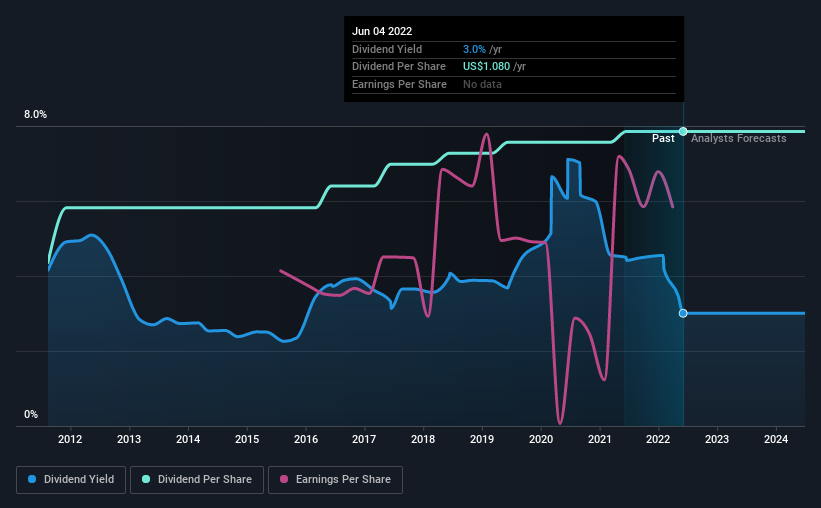Why You Might Be Interested In H&R Block, Inc. (NYSE:HRB) For Its Upcoming Dividend
It looks like H&R Block, Inc. (NYSE:HRB) is about to go ex-dividend in the next couple of days. The ex-dividend date is usually set to be one business day before the record date which is the cut-off date on which you must be present on the company's books as a shareholder in order to receive the dividend. The ex-dividend date is important because any transaction on a stock needs to have been settled before the record date in order to be eligible for a dividend. Therefore, if you purchase H&R Block's shares on or after the 7th of June, you won't be eligible to receive the dividend, when it is paid on the 1st of July.
The company's upcoming dividend is US$0.27 a share, following on from the last 12 months, when the company distributed a total of US$1.08 per share to shareholders. Calculating the last year's worth of payments shows that H&R Block has a trailing yield of 3.0% on the current share price of $35.94. Dividends are an important source of income to many shareholders, but the health of the business is crucial to maintaining those dividends. As a result, readers should always check whether H&R Block has been able to grow its dividends, or if the dividend might be cut.
See our latest analysis for H&R Block
Dividends are typically paid from company earnings. If a company pays more in dividends than it earned in profit, then the dividend could be unsustainable. That's why it's good to see H&R Block paying out a modest 43% of its earnings.
Click here to see the company's payout ratio, plus analyst estimates of its future dividends.
Have Earnings And Dividends Been Growing?
Companies with consistently growing earnings per share generally make the best dividend stocks, as they usually find it easier to grow dividends per share. Investors love dividends, so if earnings fall and the dividend is reduced, expect a stock to be sold off heavily at the same time. For this reason, we're glad to see H&R Block's earnings per share have risen 12% per annum over the last five years. Earnings per share have been growing rapidly and the company is retaining a majority of its earnings within the business. Fast-growing businesses that are reinvesting heavily are enticing from a dividend perspective, especially since they can often increase the payout ratio later.
Many investors will assess a company's dividend performance by evaluating how much the dividend payments have changed over time. In the last 10 years, H&R Block has lifted its dividend by approximately 6.1% a year on average. It's encouraging to see the company lifting dividends while earnings are growing, suggesting at least some corporate interest in rewarding shareholders.
To Sum It Up
From a dividend perspective, should investors buy or avoid H&R Block? Companies like H&R Block that are growing rapidly and paying out a low fraction of earnings, are usually reinvesting heavily in their business. This is one of the most attractive investment combinations under this analysis, as it can create substantial value for investors over the long run. In summary, H&R Block appears to have some promise as a dividend stock, and we'd suggest taking a closer look at it.
With that in mind, a critical part of thorough stock research is being aware of any risks that stock currently faces. To help with this, we've discovered 4 warning signs for H&R Block (2 are a bit concerning!) that you ought to be aware of before buying the shares.
If you're in the market for strong dividend payers, we recommend checking our selection of top dividend stocks.
Have feedback on this article? Concerned about the content? Get in touch with us directly. Alternatively, email editorial-team (at) simplywallst.com.
This article by Simply Wall St is general in nature. We provide commentary based on historical data and analyst forecasts only using an unbiased methodology and our articles are not intended to be financial advice. It does not constitute a recommendation to buy or sell any stock, and does not take account of your objectives, or your financial situation. We aim to bring you long-term focused analysis driven by fundamental data. Note that our analysis may not factor in the latest price-sensitive company announcements or qualitative material. Simply Wall St has no position in any stocks mentioned.

